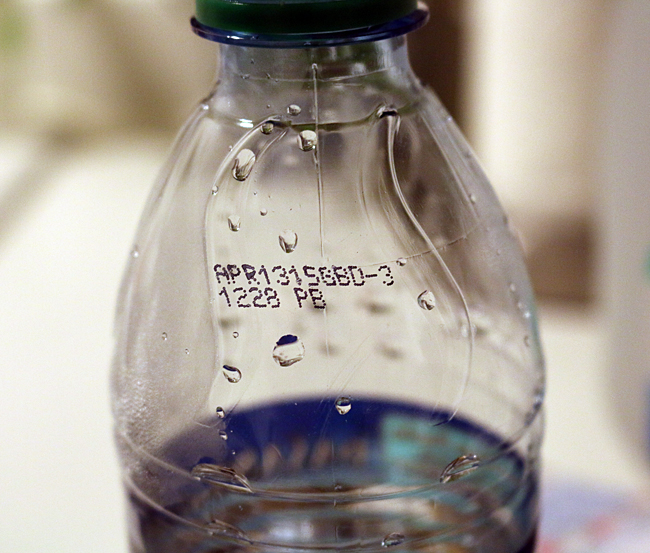I was joking about plastic bottles of water having expiration dates with the person sitting next to me at a certain conference in Las Vegas which was not discussed by any of the other “bloggers” at BoardingArea, saying “what is going to happen to the water? It will spoil?”
Apparently so, according to this article written by Laura Tedesco of Yahoo! Health — especially if the water reaches a warm or hot temperature at one point, causing the release of a trace heavy metal substance known as antimony. “Antimony, a trace heavy metal, has been found to play a role in lung, heart, and gastrointestinal diseases, according to a 2009 study review. The International Agency for Research on Cancer classifies one form of the metal, called antimony trioxide, as a ‘possible carcinogen.’ BPA, meanwhile, is a chemical that can mimic estrogen in the body and which is found in some plastics; it’s been banned for use by the FDA in baby bottles and sippy cups.”
Wow. Am I going to die?
Higher levels of antimony apparently leach into the water from the plastic of the bottle when the temperature increases — such as in a hot car or at a warehouse with little to no climate control where cases of the water could be stored for an undetermined period of time.
Of course, one solution could be to simply drink the tap water available wherever you are located. Having been born and raised in New York — where I personally believe that the tap water is the tastiest and best in the world, bar none, no question, by far, period, end of story — I used to laugh at people who drank bottled water in New York.
I truly miss that water. I do not care if it was filtered with garbage from a toxic waste dump. I would like to have a pipeline tapping into New York City tap water and have it pumped to my home. I have traveled all over the world; and the only water I found to even come close was this bottled water I had somewhere in Kentucky years ago. I forgot the brand name of that water. I should have written it down so that I could have enjoyed it when I returned to Kentucky earlier this year.
My mouth became parched at one point while I was in my hotel room in Las Vegas — dry desert air can do that to you — and my supply of bottled water was depleted. I resorted to filling an empty water bottle with tap water and drank it.
Blech. That stuff was barely drinkable to me. Give me antimony-laced bottled water any day.
I suppose another solution could be to transfer your water to a container considered safer to store your water — even at a warmer temperature — but that does not eliminate the possibility that the water might have been stored in a hot warehouse somewhere during the distribution process.
Antimony is apparently necessary for the manufacture of polyethylene terephthalate — also known as PET — which is currently the most popular material for the packaging of food and beverages…
…which means that the real solution to this issue — if this is even an issue at all — is to develop safer packaging for food and beverages. Of course, that takes money — something companies seem to be loathe to spend these days.
My father enjoyed cold soft drinks — extra points if the sweetener of the soft drink was sugar and not high-fructose corn syrup — out of real glass bottles instead of plastic bottles or aluminum cans. I agree that they do seem to taste better from glass bottles. Unfortunately, glass is significantly heavier than plastic; more expensive to manufacture; and more fragile than plastic.
I cannot imagine drinking water out of an aluminum can. I probably did drink water out of an aluminum can at some point in my life; and you can see what a memorable experience that was for me…
…so what is the solution? I have not heard of a wave of people suffering from antimony poisoning; but how can drinking water be delivered to you in a manner which is safer and better?
What are your thoughts?
Photograph ©2014 by Brian Cohen.

